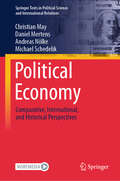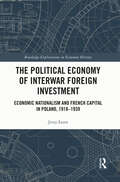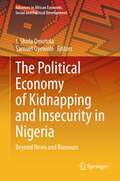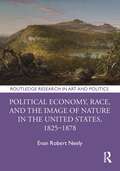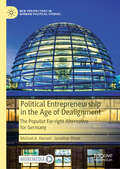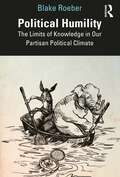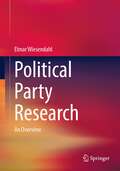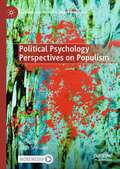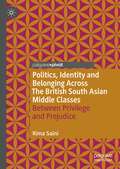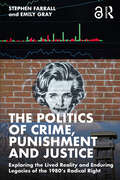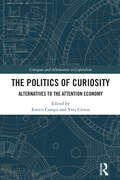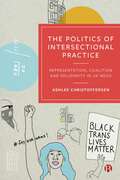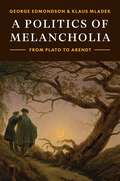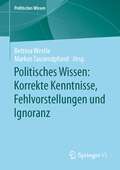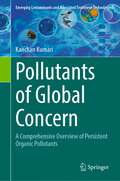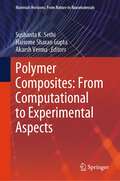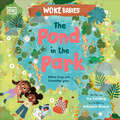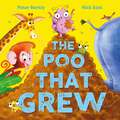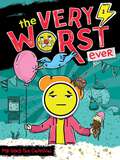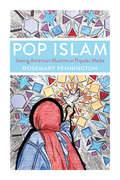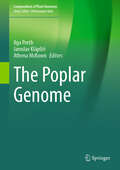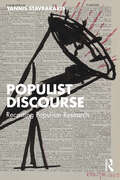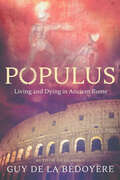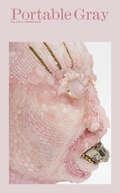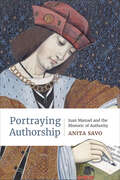- Table View
- List View
Political Economy: Comparative, International, and Historical Perspectives (Springer Texts in Political Science and International Relations)
by Christian May Daniel Mertens Andreas Nölke Michael SchedelikThis textbook offers a comprehensive introduction to Political Economy. It combines comparative,international and historical perspectives into a holistic framework of analysis. Drawing on the workof Karl Polanyi, the book shows how capitalist economies differ around the globe and how they areembedded in the international economic order. Through a critical-institutionalist lens, it helps toaccount for the evolution of contemporary capitalism and addresses current topics at the intersection of political science and economics.Students and instructors can draw on supplementary material, such as Power Point slides withall figures and tables as well as the Springer Nature Flashcards app with exercises.
The Political Economy of Interwar Foreign Investment: Economic Nationalism and French Capital in Poland, 1918–1939 (Routledge Explorations in Economic History)
by Jerzy ŁazorFrance was interwar Poland’s main ally, and the biggest source of the country’s foreign investment. The two roles were closely connected: Paris used its position in Warsaw to win preferential treatment for its firms, while Polish authorities depended on France to finance their modernization policies and military spending. The relationship’s asymmetric character bred conflict, and in the 1930s dissenting voices compared French actions in Poland to imperialism and colonial expansion. This book untangles the complex mix of economics, policy, and politics in Franco-Polish relations. Based on government and company-level sources, it evaluates the part played by French capital in Poland and discovers the mechanisms ruling French FDI and public loans. Exploring case studies of specific sectors and themes, it asks questions about the modernizing potential of FDI, interwar economic imperialism, the workings of asymmetric investment, and the interactions between investments and politics. Understanding the unequal footing of Warsaw and Paris, it goes beyond imperialistic interpretations, and examines the leeway available to the weaker partner of the relationship. The book contributes to economic history of Central and Eastern Europe, and, more generally, to our understanding of the position of peripheral countries in the interwar global system.
The Political Economy of Kidnapping and Insecurity in Nigeria: Beyond News and Rumours (Advances in African Economic, Social and Political Development)
by J. Shola Omotola Samuel OyewoleProviding unique perspectives on one of the leading hotspots of kidnapping in the world, this book examines the political and socioeconomic dimensions of the causes, manifestations, and consequences of kidnapping in Nigeria, as well as some of the control measures that have been adopted at different levels of governance and their effectiveness. The topics covered in the volume include details on the framework of understanding kidnapping, the evolution of kidnapping from pre-colonial to post-colonial eras, and the relationship between ungoverned spaces and kidnapping in the country. The book further sheds light on kidnapping in the context of insurgent campaigns, with insights into oil-related militancy in the Niger Delta region, with the Islamist Boko Haram insurgency and terrorism in the Northern region of Nigeria. It discusses non-insurgent kidnapping, situating kidnapping in the contexts of banditry, ransoming, ritualism, baby factory, and human trafficking. Additionally,the volume analyses the emerging gender and transnational frontiers of kidnapping in Nigeria. Expanding the discussion on state responses, this book also looks into responses of non-state actors to kidnapping as well as negotiations in hostage crisis management. Finally, it examines other unique subjects, such as media coverage of kidnapping, and the consequences for Nigeria’s international image. The book will appeal to students, scholars, and researchers of political science, international relations, economics, sociology, history, law and business management in general, as well as African studies, security studies, criminology, peace and conflict studies, and geography and area studies. It will also be helpful for public policy-makers, African security experts and professionals, as well as business managers, risk analysists and insurance industry that are interested in a better understanding of kidnapping and associated political, social, economic, and security dynamicsin Nigeria and beyond.
Political Economy, Race, and the Image of Nature in the United States, 1825–1878 (Routledge Research in Art and Politics)
by Evan Robert NeelyPolitical Economy, Race, and the Image of Nature in the United States, 1825–1878 is an interdisciplinary work analyzing the historical origins of a dominant concept of Nature in the culture of the United States during the period of its expansion across the continent.Chapters analyze the ways in which “Nature” became a discursive site where theories of race and belonging, adaptation and environment, and the uses of literary and pictorial representation were being renegotiated, forming the basis for an ideal of the human and the nonhuman world that is still with us. Through an interdisciplinary approach involving the fields of visual culture, political economy, histories of racial identity, and ecocritical studies, the book examines the work of seminal figures in a variety of literary and artistic disciplines and puts the visual culture of the United States at the center of intellectual trends that have enormous implications for contemporary cultural practice.The book will be of interest to scholars working in art history, visual culture, American studies, environmental studies/ecocriticism, critical race theory, and semiotics.
Political Entrepreneurship in the Age of Dealignment: The Populist Far-right Alternative for Germany (New Perspectives in German Political Studies)
by Michael A. Hansen Jonathan OlsenThis book traces the rise of the far-right Alternative for Germany (AfD) from its inception in 2013 to its re-election to the Bundestag in 2021, emphasising the party’s nature as a “populist issue entrepreneur” and covering the three major crises that have shaken European party politics – the Eurozone crisis, the so-called refugee crisis and the COVID pandemic. Currently, books on the AfD are largely limited to historical accounts and surface-level analyses of the party. This volume is both empirically rigorous and conceptually nuanced: it seeks to understand the party’s political trajectory and its appeal to its supporters by using advanced quantitative methodologies to analyse voter behaviour, as well as by interpreting the party’s communication strategies through mixed empirical methods. It embeds this account within a well-grounded theoretical argument. The argument emphasises three important explanatory conditions – a favourable political opportunity structure, issue entrepreneurship, and the party’s stages of political development.
Political Humility: The Limits of Knowledge in Our Partisan Political Climate
by Blake RoeberThis book aims to change the way we think about politics, talk about politics, and vote.It does this in two ways. First, it shows it’s impossible for a Republican, Democrat, or voter in any political party to possess a significant level of knowledge of facts that would help their party secure or maintain political power. It calls this knowledge “political knowledge” and shows how unfeasible it is for anyone to have it. Second, it explains how we might best be politically engaged, given that we have virtually no political knowledge.To argue that it is impossible for any person to possess a significant amount of political knowledge, the book depends on two empirically verified facts. The first is that we have virtually no means of acquiring political information except by believing what other people say. The second is that, when people start talking about politics, they become highly unreliable. They’re very likely to say false things when voicing political opinions because they employ a belief‑forming process that psychologists call “identity protective cognition.” This is a type of reasoning aimed, not at truth, but at preserving one’s membership in some identity‑defining group. In combination, these two observations cast serious doubt on all of our political beliefs.As the book explains, however, the proper response to this doubt is not to simply avoid politics. Rather the best response is a kind of humble but real engagement with politics that constantly manifests one’s awareness that one is, at best, making educated guesses rather than speaking and acting from knowledge.
Political Party Research: An Overview
by Elmar WiesendahlThe book by the well-known German party researcher Elmar Wiesendahl presents the development, theoretical perspectives, research approaches, and fields of investigation in party research in light of the state of the art.
Political Psychology Perspectives on Populism (Palgrave Studies in Political Psychology)
by Gilda SensalesThis book explores the different forms of populism in European countries. Starting from a theoretical point of view, the authors outline the various psychosocial precursors of populisms that have emerged from empirical investigations. Using both mainstream and critical perspectives, the book shows how the field has driven multiple research programmes and methodologies. The authors draw on questionnaires and political communication via social media to analyse the opinions, attitudes, and representations of laypeople and populist leaders. The volume is aimed at researchers, students, and readers with expertise on the subject. It collects contributions from scholars of social psychology, proposing an innovative reading of the social-cognitive, motivational, and emotional processes that can fuel populism.
Politics, Identity and Belonging Across The British South Asian Middle Classes: Between Privilege and Prejudice (Palgrave Politics of Identity and Citizenship Series)
by Rima SainiThis book will discuss the growing socio-economic and political diversity of the groups that comprise the British South Asian diaspora, with a focus on the formation of the British South Asian "middle classes". They will be framed within this work as a heterogenous sub-population, but this book is be the first comprehensive effort to define them sociologically as a distinct ethnoracial collective with a unique political profile. It does this with reference to secondary statistical data and primary interview data, and engages with relevant academic and non-academic literature. It describes the ways in which socially mobile South Asian migrants and particularly their descendants in the UK relate to their racial, ethnic, religious, classed and gendered identities, their relationship with ‘Britishness’, and their politics. It will therefore be of interest to students and researchers of political sociology, particularly those specialising in race, processes of racism and racialisation, ethnic and ethno-religious identity, class and social mobility amongst ethnic minority groups, and the interaction between minority identity and political identity.
The Politics of Crime, Punishment and Justice: Exploring the Lived Reality and Enduring Legacies of the 1980’s Radical Right
by Stephen Farrall Emily GrayThis book explores the impact of right-wing political ideology on crime, the criminal justice system, and attitudes towards punishment in Britain. Grounded in a rigorous analysis of repeated cross-sectional surveys such as the British Social Attitudes Survey and the British Crime Survey, as well as individual-level cohort data such as the 1958 National Child Development Study and the 1970 British Cohort Study, it examines changes in long-term crime rates, criminal justice policies, and their integration with social and economic policies in Britain over four decades. It offers a detailed discussion of how radical social and economic changes affected the fear of crime and attitudes to punishment, and how well Thatcherite social and economic values were embedded in contemporary British society. Drawing on a wide literature across criminology, political science, sociology, and social policy, this book demonstrates how a thorough understanding of crime cannot take place without an examination of the wider social policies enacted, the life-courses of the individuals affected, and their communities and the political environment in which they live. It is essential reading for criminologists, sociologists, political philosophers, and social theorists alike since it combines thinking from political sciences, life-courses theories, and detailed analyses of the outcomes of social policy change.The Open Access version of this book, available at http://www.taylorfrancis.com, has been made available under a Creative Commons [Attribution-Non Commercial-No Derivatives (CC-BY)] 4.0 license.
The Politics of Curiosity: Alternatives to the Attention Economy (ISSN)
by Enrico Campo Yves CittonThrough a variety of studies in the emerging field of attentional studies, this book examines and seeks alternatives to the current attention economy. Bringing together the work of leading scholars of ‘critical attention studies’ to reflect on issues such as techno-politics, socio-politics, and the politics of distraction, it offers a new and multi-disciplinary conceptualization of attention that emphasizes the connections between attention and curiosity, distraction, decoloniality and care. Above all, The Politics of Curiosity asks us to consider the nature and ambivalence of the curious forms of politics that might be taking shape in the shadow of our current attention economy.The “attention economy” has become a household name: we all know our attention is being harvested, commodified and packaged to be sold to advertisers by capitalist platforms. We all complain about it; some of us dream of disconnection; others call to fight back. By focusing on attentional deficits, and by reducing attention to being focused, however, the common view may miss wider stakes, and more promising opportunities. This collective volume provides a new frame of analysis based on three displacements. First, it relocates attentional issues within a triangulation that explores a continuum between attention, distraction and curiosity. Second, it invites us to investigate into the mental infrastructures that socially condition our perceptions and understandings of the world. Third, it points towards emancipatory politics of curiosity to provide alternatives to the attention economy. Contributions range from pedagogy to media theory, via digital studies, epistemology, sociology, political philosophy, literary history, aesthetics, film and dance studies. They gather some of the leading scholars who shaped the study of attention, questioned the values of distraction and explored the potentials of curiosity over the recent years. They extend across nine countries, four continents and seven languages, to provide a multicultural approach to these debates. Together, they help us understand how our current mental infrastructures have taken shape, under specific regimes of power and authority, in a world dominated by capital, colonialism and patriarchy. But they also sketch what can be done to redeploy them around imperatives of respect and care – from a better awareness of our mental biases, online behaviors and bodily movements, to our collective capacity to restructure classroom interactions, to launch alternative digital platforms, to build democratic movements.The first platform for discussion of the politics of attention and curiosity – and an essential point of reference for future debate – this book will appeal to scholars of sociology, politics and psychology.
The Politics of Intersectional Practice: Representation, Coalition and Solidarity in UK NGOs
by Ashlee ChristoffersenIt is increasingly recognized that, to achieve social justice, policies and organizations need to apply an intersectional approach, rather than addressing inequalities separately. However, intersectionality is a challenging theory to apply, as policy makers and practitioners often navigate the confines of divided policy areas. This book examines the use of intersectionality in UK policy and practice, with a specific focus on NGOs, outlining five distinct interpretations of intersectional practice and their implications. Drawing from extensive fieldwork with a diverse range of equality organizations, this book offers invaluable insights into how policy and practice can be organized in more (and less) intersectional ways.
A Politics of Melancholia: From Plato to Arendt
by George Edmondson Klaus MladekWhy melancholia is a vital form of social critique and a catalyst for political renewalMelancholia is wrongly condemned as a condition of withdrawal and despair that alienates its sufferer from community. Countering that misconception, A Politics of Melancholia reclaims an understanding of melancholia not as an affliction in need of a remedy but as an affirmative stance toward decay and ruination in political life, and restores the melancholic figure—by turns inventive and destructive, outraged and inspired—to their rightful place as the poet of political thought.George Edmondson and Klaus Mladek identify pivotal moments of political melancholia in ancient and modern texts, offering new perspectives on the death of Socrates in Plato&’s dialogues, the fratricide in Hamlet, Woyzeck&’s killing of Marie in Georg Büchner&’s Woyzeck, the murder of Moses in Freud&’s thought, and the betrayal of the revolutionary idea that Hannah Arendt identifies in her critique of eighteenth-century revolutions. Melancholia emerges here as a disposition that is mournful but also jubilant, a mood of unbending disconsolation that remains faithful to a scene of downfall, to events that cannot be forgotten, and to things that cannot be governed.Recovering a tradition of thought that is both affirmative and hopeful, this eloquent book reveals how political melancholia embodies a shared condition of discontent that binds communities together and inspires change.
Politisches Wissen: Korrekte Kenntnisse, Fehlvorstellungen und Ignoranz (Politisches Wissen)
by Bettina Westle Markus TausendpfundWissenschaftliche Arbeiten zu politischem Wissen der Bevölkerung in Deutschland konzentrieren sich zumeist auf die Analyse vorhandener Faktenkenntnisse und stellen diesen die zusammengefassten fehlenden und falschen Antworten gegenüber. Damit wird die Differenzierung zwischen Fehlvorstellungen (falsche Antworten) und Ignoranz (fehlende und „weiß nicht“ Antworten) vernachlässigt. Die Beiträge dieses Bands greifen diese Differenzierung mit unterschiedlichen Untersuchungsdesigns und zu verschiedenen Politikbereichen auf. Die Befunde zeigen, dass falsche und fehlende substanzielle Antworten nicht zusammengefasst werden sollten, da sie sowohl mit unterschiedlichen Determinanten als auch verschiedenen Folgen verbunden sind.
Pollutants of Global Concern: A Comprehensive Overview of Persistent Organic Pollutants (Emerging Contaminants and Associated Treatment Technologies)
by Kanchan KumariThis book is a compilation of all the necessary attributes associated with the knowledge of Persistent Organic Pollutants (POPs) that have been meticulously identified and charted down by the Stockholm Convention. Essential details starting from technical characteristics of the POPs to their expanse of nationwide usage, their remedial procedures adopted in India in comparison to available international data, and their consequent effects on biota and future perspectives are summarized with precision. Additionally, in-house scientific works that have been performed on each chemical are presented. Moreover, a unique feature of this book is that each chapter is dedicated to focusing on a single POP so that all the aspects of its usage, effects and fate can be accurately laid out. The book aims to be a go-to guidebook for stakeholders and academicians dealing with these chemicals who wish to be more acquainted with the present scenario of POPs and their status.
Polymer Composites: From Computational to Experimental Aspects (Materials Horizons: From Nature to Nanomaterials)
by Sushanta K. Sethi Hariome Sharan Gupta Akarsh VermaThis book is intended to shed light on the computational modeling and experimental techniques that are used in the characterization of various polymer based composite materials. It covers mechanisms, salient features, formulations, important aspects, and case studies of polymer composite materials utilized for various applications. The latest research in this area as well as possible avenues of future research is also highlighted to encourage the researchers.
The Pond in the Park: Where Frogs and Friendships Grow (Woke Babies Books)
by Flo FieldingA magical STEM story that sees frog spawn transform into frogs as Millie’s own special friendship grows.Millie has started at a new school and making friends hasn’t been easy. On a morning stroll through the park before school, Millie’s dad points out a pond filled with frog spawn and explains that soon they will go through BIG changes. Just as the frog spawn will grow and transform, can Millie embrace the changes in her life?Made in collaboration with Woke Babies, this book offers a gentle introduction to the incredible life cycle of a frog, while helping children overcome their own worries about change and new beginnings. This is a wonderful reminder that sometimes friendships take time to blossom, but it encourages children to take a chance anyway. With vivid illustrations accompanying the exciting STEM story, The Pond in the Park is the perfect gift for a little one, or for anyone looking for a heart-warming story with inspiring characters.
The Poo That Grew
by Peter BentlyThe animals were in a funk. The poop was EVERYWHERE. It stuck to paw and claw and trunk, To tail and horn and hair. Dung beetles love to chew on other animals' tasty poo. But when the monkeys make fun of them for having such a stinky lunch, the beetles decide to munch elsewhere. What the monkeys didn't realise is that without the beetles, there's no one to clean up their business. And so, the pile of poo grew and grew and GREW. In this hilarious picture book, Peter Bently imagines what might happen if dung beetles stopped doing their job and shows children that every creature is important to our environment, even those that are small and smelly.
Pop Goes the Carnival (The Very Worst Ever #2)
by Andy NonamusA very unlucky kid must create a booth for his school carnival while avoiding disaster in the second book in The Very Worst Ever chapter book series![REDACTED] keeps his name and school secret—even hiding his appearance behind stickers. Why? Because his bad luck is super embarrassing! It&’s carnival time at school, which means games, food, and fun rides! Not only that, but every student has to come up with a booth and [REDACTED] simply has to win and be gifted the ultimate prize…a LUCKY BRACELET! But first, he needs to come up a winning booth idea, deal with a creepy sad clown, and compete against his best friends. What could go wrong except everything?! With easy-to-read language and illustrations on almost every page, The Very Worst Ever chapter books are perfect for emerging readers.
Pop Islam: Seeing American Muslims in Popular Media
by Rosemary PenningtonIn the West, Islam and Muslim life have been imagined as existing in an opposing state to popular culture—a frozen faith unable to engage with the dynamic way popular culture shifts over time, its followers reduced to tropes of terrorism and enemies of the state. Pop Islam: Seeing American Muslims in Popular Media traces narratives found in contemporary American comic books, scripted and reality television, fashion magazines, comedy routines, and movies to understand how they reveal nuanced Muslim identities to American audiences, even as their accessibility obscures their diversity. Rosemary Pennington argues that even as American Muslims have become more visible in popular media and created space for themselves in everything from magazines to prime-time television to social media, this move toward "being seen" can reinforce fixed ideas of what it means to be Muslim. Pennington reveals how portrayals of Muslims in American popular media fall into a "trap of visibility," where moving beyond negative tropes can cause creators and audiences to unintentionally amplify those same stereotypes. To truly understand where American narratives of who Muslims are come from, we must engage with popular media while also considering who is allowed to be seen there—and why.
The Poplar Genome (Compendium of Plant Genomes)
by Ilga Porth Jaroslav Klápště Athena McKownThis book is the first comprehensive compilation of research on state‐of‐the-art genomics on the most advanced model tree species including genome assemblies, insights into genomic structural features and methylation patterns, whole‐genome resources used for population genomics and adaptation to climate, enabled breeding vs. classical genetics and traditional breeding, comparative genomics, and elucidations on functional genomics. The latest developments in the genomics of wood formation are particularly highlighted. Altogether, the book contains over 300 pages in over 15 chapters authored by globally reputed experts in the relevant fields of this tree crop’s genomics research. This book is useful for students, teachers, and scientists in academia and governmental or private tree improvement agencies or companies interested in genetics, pathology, entomology, physiology, molecular genetics and breeding, in vitro culture and genetic engineering, land restoration, and agroforestry solutions.
Populist Discourse: Recasting Populism Research
by Yannis StavrakakisPopulist Discourse: Recasting Populism Research offers a refreshingly innovative discourse theory perspective on populist phenomena. Reading this book will help you familiarize yourself with the historical genealogy of significant populist phenomena from the end of the 19th century onwards and with the main conceptual/theoretical accounts established to analyse them. Mainstream conceptualizations of populism in both academia and public discourse are critically discussed in order to map new, promising avenues for research. Inspired by the works of Ernesto Laclau and Chantal Mouffe, the book addresses current challenges within populism research and highlights the new directions that a conceptually nuanced, theoretically rigorous and historically informed discursive orientation can contribute to the contemporary study of populism. Without sacrificing attention to detail, strong bibliographical support and a focus on the future development of populism research, Populist Discourse is written in accessible language to engage populism scholars, advanced undergraduates and graduate-level students within the field of political science. Due to its interdisciplinary character, it will also appeal to readers associated with various politically informed area studies and the broader field of ideology and discourse analysis.
Populus: Living and Dying in Ancient Rome
by Guy de la BédoyèreThis revealing look at life in ancient Rome offers a compelling journey through the vivid landscape of politics, domestic life, entertainment, and inequality experienced daily by Romans of all social strata. Frenzied crowds, talking ravens, the stench of the Tiber River: life in ancient Rome was stimulating, dynamic, and often downright dangerous. The Romans relaxed and gossiped in baths, stole precious water from aqueducts, and partied and dined to excess. Everyone from senators to the enslaved crowded into theaters and circuses to watch their favorite singers, pantomime, and comedies and scream their approval at charioteers. The lucky celebrated their accomplishments with elaborate tombs. Amid pervasive inequality and brutality, beauty also flourished through architecture, poetry, and art. From the smells of fragrant cookshops and religious sacrifices to the cries of public executions and murderous electoral mobs, Guy de la Bédoyère’s Populus draws on a host of historical and literary sources to transport us into the intensity of daily life at the height of ancient Rome.
Portable Gray, volume 7 number 1 (Spring 2024)
by Portable GrayThis is volume 7 issue 1 of Portable Gray. Portable Gray (PG), interdisciplinary in scope and dedicated to experimentation, offers a forum for artists and scholars to consider how collaboration can enrich their practices and foster new discoveries. Encouraging contributors to play with artistic and literary forms and modes in order to challenge long-held ideas, PG features essays, interviews, poetry, art, and musical compositions, among other works.
Portraying Authorship: Juan Manuel and the Rhetoric of Authority (Toronto Iberic #88)
by Anita SavoPortraying Authorship argues that the medieval Castilian writer Juan Manuel fashioned a seemingly modern authorial persona from the accumulation and synthesis of medieval authorial roles. In the manuscript culture of medieval Castile and across Latin Europe, writers typically referred to their work in ways that corresponded to their role in the bookmaking process: scribes took credit for preserving the works of others, compilers for combining disparate texts in productive ways, commentators for explaining obscure works, and authors for writing their own words. Combining literary analysis with book history, Anita Savo reveals how Juan Manuel forged his authorial persona, “Don Juan,” by adopting all four medieval writerly roles, thereby reaping the ethical benefits of each one. Each chapter in Portraying Authorship highlights a different authorial role to show how Don Juan – and others who wrote in his name – assumed responsibility for that role and adapted its rhetoric to his vernacular literary project. The book concludes that Don Juan’s authorial self-portrait not only gave the humanist writers of the fifteenth century a model to imitate, but also persuaded subsequent scribes, editors, and translators to portray him as an individual author. In doing so, Portraying Authorship illuminates how Juan Manuel’s concept of authorship helped to secure him a privileged position in narratives of Spanish literary history.
